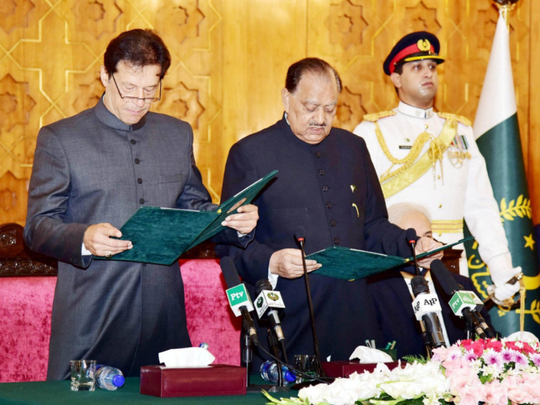
The euphoria among diehard supporters of Pakistan’s former cricket star Imran Khan finally led him to take charge as the country’s prime minister yesterday. It is a journey that has taken about 22 years since Imran first stepped into the murky world of politics in Pakistan, launching his ‘Pakistan Tehreek-e-Insaf’ (PTI) or Pakistan Justice Movement, armed with the principal objective of removing injustice across the South Asian country. Though last month’s election was fought hard and its aftermath continues with Imran’s opponents still claiming widespread rigging, the hardest part of running Pakistan is yet to come.
Some of Pakistan’s political pundits have already set the first 100 days milestone as the next moment when the government’s performance will be judged. In brief, however, nothing could be more absurd in a country where the past five years under former prime minister Nawaz Sharif have been an unmitigated disaster. Turning back to sanity in more ways than one in just 100 days will clearly be an insane expectation.
The former regime must be remembered for setting a new record in reckless spending that also led to an unprecedented weakening of the country’s economy. Other similarly disastrous records include a reckless push to decorate selective areas of Pakistan with flashy new infrastructure projects while a record number of Pakistanis remained deprived of fundamental amenities such as health care, education, food, shelter and of course clean drinking water.
The very fact that Sharif was disqualified by the Supreme Court on a trial triggered by the discovery of massive overseas wealth of three of his children — as revealed in the ‘Panama leaks’ — seems to be often ignored by the former leader.
That said, now its Imran’s turn to preside over his new throne, faced with the toughest of challenges that can conceivably surround any modern-day state. Though he has promised to create an Islamic welfare state, relief for Pakistan’s poorest of the poor is unlikely to come in the near term. The crisis triggered by Pakistan’s depleting foreign currency reserves will quickly press the new government to seek a bailout, possibly from the International Monetary Fund (IMF) — a regular source of sovereign bailouts so far as Pakistan is concerned. Any other bailout will also not come without pain. And then the well-known internal security challenges, alongside those related to foreign policy, will not make life any easier for Islamabad’s new rulers.
But that said, there is bound to be light at the end of the tunnel so to speak. Pakistanis who voted for Imran clearly broke ranks with political powers of yesteryears, in favour of what many saw as the hope for a better tomorrow. Imran is clearly self-made, comes from a middle-class background and has made history not just as a popular cricket captain, but also as the founder of Pakistan’s first dedicated cancer hospital and research centre — the Shaukat Khanum Memorial Hospital in Lahore, which he built in his late mother’s memory. And then a college affiliated with the United Kingdom’s Bradford University, located near Imran’s ancestral town of Mianwali, was no mean feat either.
These landmarks, though quickly pale in comparison to the crisis surrounding Pakistan, still highlight the passion of the country’s new ruler. That passion in the first 100 days will be ideal to set a clear new path for Pakistan to emerge out of its current crisis and head towards a better future. If Imran can have a dedicated new Cabinet of individuals with unblemished records and give them clearly defined tasks for a reformist future, that in itself will mark a solid new beginning. The new premier has announced his decision to stay away from the opulence of the prime minister’s official residence in Islamabad, instead opting for an alternative accommodation. Though the gesture may well appeal to Pakistanis who are forced to live in mud huts and shacks, there needs to be a push further. Beyond just the prime minister, all functionaries of the Pakistani state — elected or not — must be ordered to vacate similarly grandiose government accommodations — some dating back to the times of the British ‘Raj’.
Though the new government’s purse strings will be tight for times to come, it can still focus on undertaking reforms without major financial implications. There are innumerable state-owned educational institutions where teachers don’t turn up regularly or hospitals that are poorly run. Such structures remained widely neglected in recent years, notwithstanding the claims of reforms by Imran’s predecessors. The challenge of making such structures become fully functional will be more of a management job, backed by a decisive push by Pakistan’s new government, than a major financial undertaking.
As for the pundits who will eagerly go through the new government’s performance chart, come the end of the first 100 days, a word of caution: After years of neglect surrounding key areas of the Pakistani government’s performance, just setting a qualitatively new reformist direction early on in itself will be no mean achievement.
Farhan Bokhari is a Pakistan-based commentator who writes on political and economic matters.










